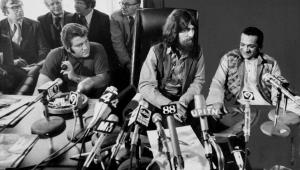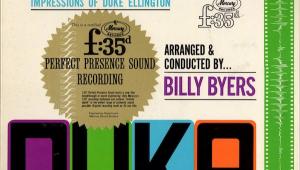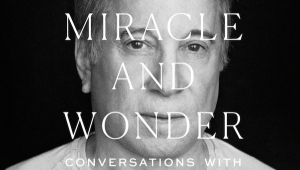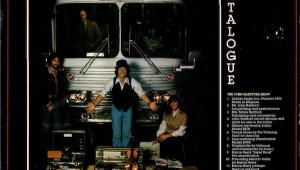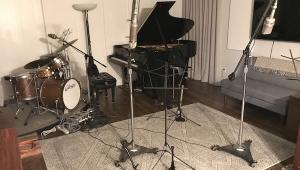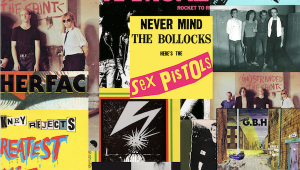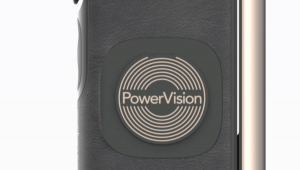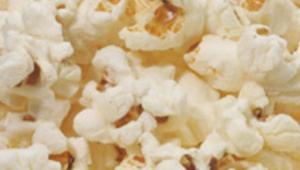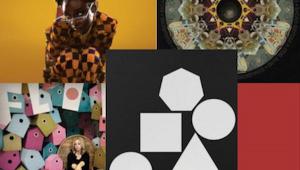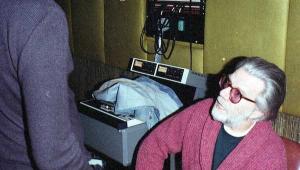David Crosby Can Remember His Name and a Great Deal More Part 2
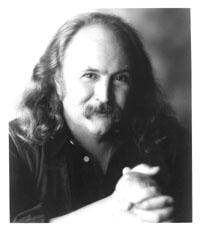
TA: Are you interested in the studio side of things, or do you just see it as a means to an end?
DC: I've been forced to get into it because I love the sound. I love making sounds. I love making it sound wonderful That's why If Only I Could Remember My Name sounded the way it did. That's me without any restraints or anybody in the way, you know? I am not a very good "tekkie" but I can hear fairly well and it's not too hard to figure stuff out. I've done things like running analog and digital off of the same recording (mic feed) and then really listening.
TA: And what did you come up with?
DC: I still like analog. I still would rather cut my tracks, anyway, on a Studer.
TA: And why is that?
DC: Two things: one transients, and the way that it handles them, you know? When a kick drum or something sort of shocks the tape, it behaves differently on the two different system but mostly overtone structures, harmonics.
TA: Like an acoustic guitar for example?
DC: Acoustic guitars or vocal effects that are tight enough to heterodyne each other and make overtone. I don't think the two systems handle overtone structures the same way.
TA: You feel that analog sounds more like the live experience, the real instrument?
DC: I don't know whether it sounds more like the live instrument but it sounds better to me and that's only a personal opinion. Sometimes the difference is miniscule, it's tiny, and it's getting smaller all the time. Sometimes if I have to build vocal structures I'll take a two track mix off of the analog tape put it into two tracks of digital and work on the digital to build up the vocal stack and then transfer the thing back so I don't run the analog tape past the heads about a bazillion times.
TA: So you use it as a tool in a sense.
DC: Yea and a very good one. The thing that interests me now is the small systems- the Yamaha and the others are making it possible to do it without spending a million bucks and that's going to give rise to a lot of change. That and you can actually step outside of the record companies and sell the record yourself. Something which I'm very tempted to do. I'm completely disappointed and angry at the record companies. I see them in the sam league as pit vipers. They wouldn't know a song if it flew up their nose and died. They're run by lawyers and accountants, the treat people like cannon fodder, the lie constantly about everything and they don't work the record. They don't do their job. There isn't any way for them to deny it. They support these enormous superstructures of people who do nothing and they take most of the money whereas if you make the record yourself and sell it yourself and get eight bucks out of the record instead of a $1.25. There are people doing it right now. I'm very tempted to do it myself.
TA: And have total creative control...
DC: I pretty much have total creative freedom over the content no matter what. Atlantic has never dared to come into a studio where I was and tell me what to do because they're afraid. I mean I'd have total control over moving it into the marketplace. I'd sell alot less, but I'd get more money per record. Prine's been doing it for years, Jorma's doing it, David Lindley, Ani DeFranco- a lot of people are doing it. And I don't see why I couldn't.
TA: The Byrds as a studio versus a stage band. Live performers versus recording artists.
DC: We were pretty good in the studio but we had more fun live.
TA: I never got to hear the original group live. The popular take was that the performances were pretty uneven. The only thing I've ever heard was the Monterey stuff
DC: Well the drummer couldn't play...never could. He looked right but he never was a very good drummer, he was a nice guy. That's one of the reasons I learned to play that chop and smack kind of rhythm because I had to learn how to play drums on the guitar. Somebody had to do and so it was me and Chris.
TA: He had a really involved style of playing bass- almost like classical counterpoint more than like a standard bass part. So that probably didn't help in locking in the rhythm.
DC: I liked his bass work alot and I like Phi Lesh of The Grateful Dead-another one who does exactly the same thing. The Grateful Dead is like a Dixieland band or was with about three or four melody lines kind of just loping through the music together.
TA: Hillman's not appreciated enough for all the influence he had on so many other young bass players who came out of the San Francisco era.
DC: Well he left that pretty much behind- he likes to play guitar and sing and he's so good at it nobody will hire him as a bass player!
TA: How did you feel when you heard "Tambourine Man" for the first time?
DC: We were driving down the street in a black '56 Ford station wagon that we had bought from Odetta for $400 and we heard it on KRLA and they played it two times in a row and we pulled over to the side and we were like lunatics! We were just stunned. We couldn't believe it. We'd heard that Tom Donahue had played it up in San Francisco but that didn't mean anything because we hadn't heard it and here it was coming out of the radio as we were driving along. It was wonderful.
TA: That was cut with session musicians- not the vocals but the parts other than McGuinn's guitar.
DC: And they wanted to keep on doing it that way, which was the standard practice in the industry at that time. That was how you did that.
TA: Did you have to make a stand to get on the album?
DC: Well how it was was they didn't have anyone else under contract except McGuinn and they said 'okay that's a great single record, now you guys go in and do the album get those same studio musicians' and Dickson said gee, the guys don't want to do that. They said it doesn't matter what they want, go get some other guys. He says, well I can't do that 'cause one of 'em is the guy who sings that harmony. They said, well okay, sign him get rid of the other ones except the ones who'll do what we tell them and I said no, sorry, that doesn't work, it's a band and we're gonna play it ourselves and they said 'noooo' and we said okay fine then you don't get a record and they had this single rocketing up the chart.
TA: And they saw money being drained.
DC: They said 'you can't do that!' We said we are doing it. Either we play the record or you don't get a record. And so they had to sign everybody and we did all the music.
TA: Did you guys use session drummers for the first album?
DC: No. We just did alot of takes.
TA: Well some of the songs- especially some of the last group of things that were on Notorious Byrd Brothers sure doesn't sound like Michael Clarke playing drums like "A Tribal Gathering" and some of the others.
DC: It's all Michael.
TA: He could do it sometimes. What do you think of the reissue CDs. Have you had a chance to listen to them?
DC: No.
TA: Well I highly recommend that you do. They're really good.
DC: I'm going to, I'm pissed though because they took liberties and put out other takes of stuff. I hear they did a different take of "Mind Garden."
TA: There's actually three chunks of "Mindgarden" on Younger Than Yesterday. One's a full alternate take and the record ends there's some little instrumental tracks from it.
DC: Well, I guess it's okay. I shouldn't be pissed. The only thing that pisses me is that they never asked anything. They never talked to me not once, they went ahead and did it and just did it. If they were gentlemen or if they had any concern about the music or if they were just even polite they would have at leas called me up and said 'hi! We're gonna do this would you like to listen to it or' - and they never did. Glad I sent the auditors over.
TA: In terms of sound quality these are far and away the best CD Byrds release there have ever been. They kept them all analog until the very end. They used a Studer two track at 30IPS and they dug through the vaults and found earlier generation masters to work from and you can really hear the sound difference. So just from that standpoint alone it would be worth your while. On "Mr. Tambourine Man" for example they found the original multitrack master and remixed that.
DC: I'll tell you the truth: the only reason I haven't listened is because it's painful to me because of Roger refusing to....I really love that music man. It's not like a lightweight thing with me. He's causing me alot of pain and I don't think he should. I don't think it's right. I'm trying not to build up a resentment against him because I know it's his right to do it but it really hurts. Imagine the lyric " and each un-harmful gentle soul misplaced inside a jail" (from "Chimes of Freedom"). Imagine how that feels to me now as opposed to then. Just to pick one.... There were so many lyrics of Dylan's that we did that talked about how much stuff that's happened after the fact and the lyrics are now ladened with so much more meaning and I want to sing them. I don't care about the money- I have a life. I'm already in a very successful band to put it mildly and I don't know...I mean I'm glad to fly wingman to the guy, I know he is the central issue there, and I understand that. I just want to do the music.
TA: That's how Hillman seems to feel. He just has a lot of respect for the music which leads me into my next question. If you go back to 1965 and go to a library and pull out a top 40 chart of what was popular and successful back then, most of that music today is just hilariously dated sounding and yet this music is thirty years old and....why is it so timeless? How has its quality lasted so many years and not dated.
DC: It's the same thing as anybody else that lasts that long. Good songs.
TA: And well performed.
DC: Yea, innovative musicianship and good craftsmanship but its the songs. The songs are about something and they're not just (yells and wails). They are trying to communicate to you. They're not just trying to express rage and give yourself a sore throat.
TA: Most of the time back then when someone had a successful single, they'd put an album out with the single and it was largely a bunch of filler and this stuff almost every one of these tracks is strong on its own- the singles aside.
DC: Yea, we felt that was the way to do it.
TA: And that was before albums became the medium. What's really amazing is that you cut all of this great music in a very short period of time- about two years. How did that happen?
DC: I don't know. It just seemed like the natural thing to do...let's see you're talking about Mr. Tambourine Man and Turn, Turn, Turn! and Fifth Dimension and Younger Than Yesterday. And of course I was on Notorious Byrd Brothers but they didn't give me credit.
TA: Well you can hear your voice and your writing but even if you take that one it's still all in three years.
DC: Well it was a very good band and it's a shame it disintegrated the way that it did- with all of our faults. I can't help but remember Roger saying 'we'll do better without you' and about a year later thinking..hmm...
TA: Guess what? It didn't work out that way. I wrote a review of that Byrds box set and I wrote 'why is all this quote later Byrds junk unquote on this box set?
DC: That's Roger. He's still trying to justify what he did and it's okay. Alot of it is because that way he gets a lot more publishing. You'll notice that there are very few, if any of my or Hillman's songs.
TA: Very few Gene Clark songs on the box. He really got cut...like "Here without You," "Set You Free This Time," gone in favor of.....
DC: Well, perhaps you might take note of that.
TA: Well I have (laughs). That's one nice thing about having these. At least you get all of the original material back. On the Mr. Tambourine Man ...."I'll Feel A Whole Lot Better"... could have been a hit single?
DC: I Loved that one. I loved any one where you could hear my guitar. You can definitely hear it there. I liked that lick.
TA: What do you think of Gene Clark as a songwriter, hearing the stuff thirty years after the fact?
DC: I think he was way ahead of his time. His changes. He didn't know the rules so he just wrote what he felt and he didn't know the rules musically or grammatically or any kind- he had no idea what the rules were, so he just wrote exactly what he felt, and I think he had a freedom about it that produced incredible music.
TA: Good singer.
DC: Yea he was.... I think Roger was better. Roger was a very good story teller.
TA: Speaking of singing, there's a beautiful harmony moment on "Bells of Rhymney" at the end. Did it take you guys a long time work that out?
DC: All done very quickly. No study up. We just kind of played them through, learned them and recorded them.
TA: I can't think of anyone who was a better harmony singer in popular music- the work you've done over the years. Especially in The Byrds where you had more room to move because there weren't as many multi-part harmonies. There are some unusual and interesting intervals...
DC: Well that's because it was mostly two part and I was able to shift between third and fourth and fifth and sixth and seventh easily- there wasn't another one part above me. I managed to still be the shifting one in the middle of CSN but there was alot less room to create tension and emotion in a three part than there is in a two part.
TA: Did you get weary of that? Is that why you went to the low part in CSN? Or because Graham Nash sings better high than low?
DC: Actually we trade off a lot. Graham is better at high harmonies than I am and the truth is I tell everybody that I'm the best harmony singer, but I really think it's him.
TA: Let me ask you why "She Don't Care About Time"- the flip side of "Turn Turn Turn"- with the Bach break in the middle the "Jesus the Joy of Man's Desire" that McGuinn did-why didn't that get on the album?
DC: No, I don't understand that at all either. I thought that was a brilliant thing. You got me.
TA: Who decided what songs would get on a record? Was it the producer?
DC: They had entirely too much say about that. We had some say. Dickson had some say. And the producers who knew nothing had alot of say in it.
TA: Back then there weren't too many young bands recording for Columbia. You were like a new species
DC: We were a new species. The only reason we got on Columbia was Miles (Davis). He said (imitating his gravelly voice) 'you ought to record these boys, they're really good' .
TA: Let's talk about Younger Than Yesterday. That was an incredible record cut in about ten days. It amazes me, the quality you put together than quickly.
DC: Well we knew what we wanted to do and by that time we'd gotten pretty good at it. I didn't know we did it that fast. That's probably the best record. I remember sitting up at Hillman's house looking out over Los Angeles, um chemically enhanced and listening to the thing and thinking 'goddamn' you know? I was really knocked out by that. I thought it was an excellent piece of work.
TA: Let's talk about the departure of Gene Clark around the 5D era. The official story has always been the aversion to airplanes and flying. Was there more to it than that?
DC: I think so. Other people were telling him he could be the next Elvis and that he was... you know, that he didn't... the standard thing...the same shit that fucking Yoko whispered in John's ear 'you don't need those guys, you're a star'. Jesus Christ, think about it. The two guys who could have had any two women on earth...... My god!!! And Gene was afraid of airplanes. We were going to a gig, we all got on the airplane he was very very nervous, he'd probably gotten himself chemically enhanced before he got on and he was sitting there and he too high or whatever it was, he panicked and got off the plane. And Roger's response was 'if you can't fly, you can't be a Byrd.'
TA: Chris Hillman said that he thought if Gene had stayed in Missouri he probably be living and well today, that he was a great example of somebody who was eaten and spit out by the Hollywood star system and lifestyle.
DC: Gene was never meant for that man. If Gene had instead gone to Nahsville, he probably would have been a huge star because he was good looking- a good looking young guy. A good singer and a good writer and he had a charisma, you know? He was a great guy.
TA: How did "Eight Miles High" come about?
DC: We were on tour. We were out. We were all pot smokers, so we couldn't ride on the regular bus with everybody else. We got a Winabago and drove it ourselves. And in the course of driving the Winabago one night we're driving from one town to another and Gene comes butt surfing up to the front of the thing and says 'I've got this song started' and he had part of the second half of the verse. So I came up with the chords to the 'eight miles high' part. And he came up with the other part. And he had words and we started working around with the words- all of us contributed to it. I came up with "rain gray town" and some other things and Roger came up with some other stuff. It was the first song we organically wrote together that freely that well and while we were on that tour I kept playing a tape machine- a reel to reel machine- hooked up to a Fender amplifier and we were playing John Coltrane's Africa Brass and if you listen to it you'll find on either "India" or the title track, you'll hear where the McGuinn solo came from. The opening notes are a straight cop from a Coltrane solo. It was really powerful music and it affected all of us. This wild, crazy, beautiful music.....And then they took it off the air!
TA: Then it was censored?
DC: Yea, there was a newsletter guy who took this big stand that that song and "Rainy Day Women" (everybody's gotta get stoned) had to go because they were breaking down our moral fiber....
TA: I know the song was about a plane flight to London, but clearly you couldn't have been unaware of the connotation or implications of the title, right?
DC: No, it had nothing to do with it.
TA: (laughs)
DC: No, honestly.
TA: What about the song "Why?" that has an Indian flavor.
DC: Yea, that came from me playing Ravi Shankar in McGuinn's ears for years. I turned everybody I could find onto that. I did that for a long time. George (Harrison) credits me with turning him onto it I think.
TA: Yea, he does.
DC: I did that for a long time and then I did that with that women's Bulgarian folk Choir.
TA: Younger Than Yesterday was the emergence of Chris Hillman as a singer and a songwriter.
DC: I thought he did really well.
TA: Was that welcome by the other members of the group?
DC: It was welcome by me, man! He is still my best friend out of the group. He's a very nice guy, a very funny guy and a very decent guy.
TA: "So You Want To Be A Rock and Roll Star"- that was a nice piece of work.
DC: Yea, my happiest thing about it is the answer back harmonies and I really loved getting Hughie Masekela on there- he's a friend of mine and that was my idea and I thought it came off great because he had such an attitude and you can feel it in the horn. It was right for him to play that. Not the moody kind of thing Miles plays- he's an African- South African music is happy shit.
TA: How about your tunes "Renaissance Fair" and "Everbody's Been Burned."
DC: "Everybody's Been Burned"- that one I think is my best set of chords, and that one I still do.
TA: Let's flash forward here a bit. What did you think of the Columbia box set?
DC: I thought it was okay. I thought it was a little heavily weighted towards Roger because Roger got to have input on it and the rest of us didn't and Roger isn't above doing unfair things occasionally. It should have had more of my stuff and Chris' stuff. And more Gene stuff.
TA: What about the Asylum reunion album?
DC: I think that's a greatly underrated record because I thought there was some beautiful stuff on there. Gene Clark doing the Neil Young song?
TA: "See the Sky About To Rain"- a nice tune.
DC: Yea, beautiful. And I thought our version of "Laughing" was beautiful. I thought it was a beautiful record, man. Some people love it, some people don't.
TA: What projects are you currently involved in? Are you touring with Stills and Nash?
DC: Yea, and I'm writing a book about benefits and civil rights demonstrations and peace marches and Amnesty International tours and Live Aid and Farm Aid and all that stuff because nobody's written a book about it, it's called "Stand Up and Be Counted", that will be out on Harper/Collins. I'm currently negotiating to make a documentary about the same book. I have bunch of songs I'm going to start writing with my son named James Raymond who is a better musician than I am and a great singer and keyboard player and he and I and my favorite guitar player Jeff Pevar are gonna go out and do some dates this fall as a trio and I'm working on trying to get another songbook out because the first one didn't even cover all the songs in the period of time it was in and I haven't had one since then except for a buy the record song book for Oh Yes I Can and I want to have one with all of my songs and all the right chords. I think I can do it. I've been experimenting with desktop publishing and I've found that you can do it.
TA: You're someone who's been very influential vocally- especially in terms of harmonies. If somebody came up to you right now and said 'who are some good harmony groups that are out right now' what would you tell them?
DC: Well obviously Boys 2 Men and All For One, but my favorite, the group I think is the best harmony group in the world right now, is a group called Venice. They are in West L.A. and they are brothers and cousins and they are the best.
TA: What style of music?
DC: CSN, The Eagles
- Log in or register to post comments






